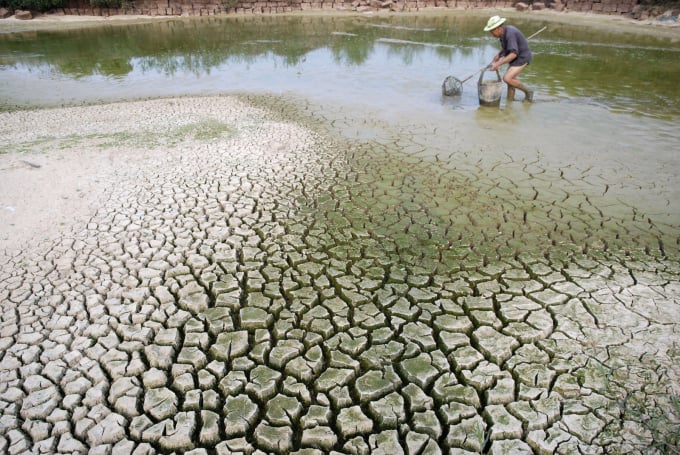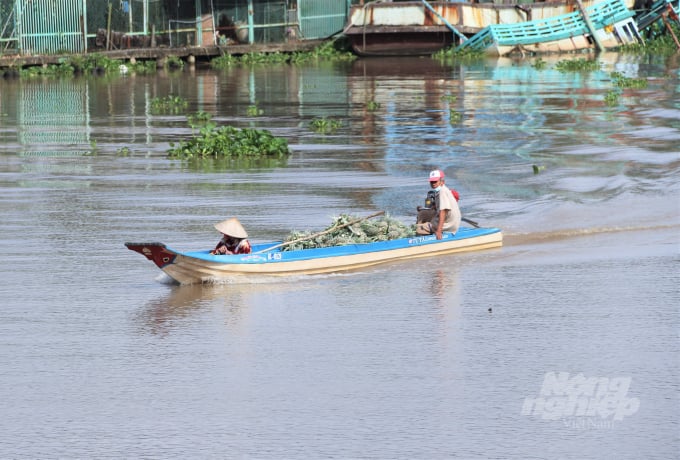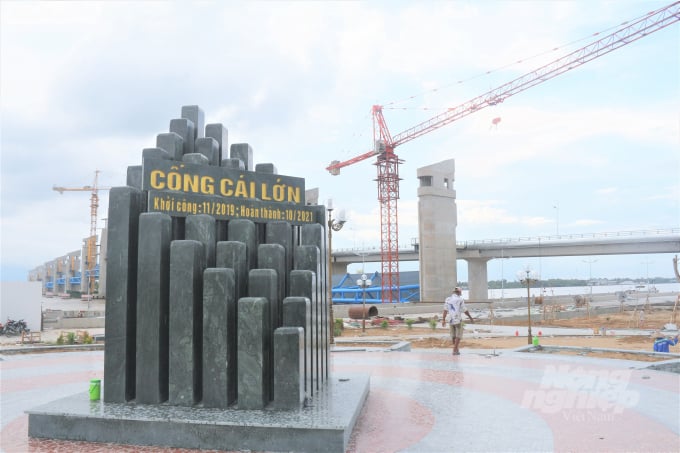November 27, 2025 | 23:57 GMT +7
November 27, 2025 | 23:57 GMT +7
Hotline: 0913.378.918
November 27, 2025 | 23:57 GMT +7
Hotline: 0913.378.918

The impact of climate change in the Mekong Delta is becoming more and more evident. Photo: TL.
The Mekong Delta has frequently been affected by large floods, saline intrusion and contaminated soil. This area suffers the most in Vietnam with 1.8 million ha of land being saline.
In recent years storms have started to become a problem. A report by the Asian Development Bank (ADB) on climate change in 1994 stated that storms do not occur in the Mekong Delta. Just over 10 years later, it can be seen that the statement is no longer accurate.
According to a forecast study published by Oxfam, there are four major risks that the Mekong Delta has to face due to climate change.
Firstly, by 2100 sea level would rise from 30cm to 1m. There is a high possibility that the sea level will rise to even more than 1m. By then, 90% of the Mekong Delta could experience flooded throughout the entire year.
Secondly, by 2030 the sea level rise would supposedly make 45% of the land area of the Mekong Delta completely saline and damage crops due to flooding.
Thirdly, the Mekong River's water discharge in dry seasons is predicted to decrease by 2-4% by 2070, which is another factor contributing to salinization and water shortage.
Fourthly, the spring rice crop would be affected due to the decline in crop yields which the decrease rate is predicted to be 8% by 2070.

The analysis and identification of climate change risks for the Mekong Delta will help localities to proactively plan and prepare appropriate responses. Photo: Pham Hieu.
Reality has shown that climate change deeply affects the lives of many Mekong Delta people, both economically and socially.
Mr. Tran Quang Hoai, Director of the Vietnam Disaster Management Authority (VNDMA - MARD), the Central Steering Committee for Natural Disaster Prevention and Control and the Ministry of Agriculture and Rural Development (MARD) had submitted to the Prime Minister to promulgate programs and resolutions especially the National Strategy on Natural Disaster Prevention and Control.
“These programs and strategies are gradually present in our daily lives. In fact, we are already enjoying the fruit of scientific advances such as new crop varieties can change people’s livelihoods and improve production value," said Mr. Tran Quang Hoai.
At the recent COP26 Submit Prime Minister Pham Minh Chinh had stated, "All actions in response to climate change must follow nature, with human being as center - the main subject for sustainable development."
Now the MARD is drastically implementing the directive of the Prime Minister regarding "follow nature" and “human being as center”.
Native and international scientists have determined that the construction of works must be in line with the progress of climate change and Mekong Delta’s current state.
“In regard to disaster prevention in the region, we focus more on the ‘human’ factor, which I believe to be the most important.
In 2016 we had zero casualties due to disasters because we had implemented many drastic measures to improve community capacity, instructing people to protect their lives and health through programs such as clean water provision or assurance of livelihoods for the locals,” said Mr. Tran Quang Hoai.

Apart from its function of natural disaster prevention and control, Cong Cai Lon's irrigation work can contribute to the economic development of the Mekong Delta. Photo: Pham Hieu.
And according to Dr. Vo Tong Xuan, Rector of Nam Can Tho University, four years after Resolution 120 was issued, provinces, cities as well as ministries and agencies have now made careful preparations to move on to the "follow nature" phase for the development of the Mekong Delta.
Localities have resolutely worked with farmers to develop technical techniques on crops as well as farming systems. Rice fields in the rainy season can store more water, creating favorable conditions for shrimp farming when the dry season comes.
Dr. Vo Tong Xuan proposed that the Government implement specifically the Master Plan in the Mekong Delta, which will solve many existing problems.
For example, there are places where the rainy season contains too much freshwater but none in the dry season. So instead of three costly rice crops while freshwater is scarce, the dry season can switch to mango growing.
Related units and farmers need to sit down with large-output businesses to exchange and coordinate more effectively.
Translated by Samuel Pham

(VAN) After the institutional merger, Da Nang possesses significant forest-carbon reserves and is proactively engaging in the carbon market, creating a new revenue stream.

(VAN) An Giang strengthens communication against IUU fishing, increases inspections and sanctions, and is determined to remove the EC’s “yellow card” while developing a sustainable fisheries sector.

(VAN) As green transition becomes a global trajectory, Viet Nam’s biggest challenge is not only technology and models, but how to ensure that capital flows reach the right beneficiaries.

(VAN) The Ministry of Agriculture and Environment must spearhead the construction of green governance, spanning decision-making processes and investment standards to policy evaluation mechanisms.

(VAN) The Agriculture and Environment sector of Khanh Hoa has achieved numerous milestones over the past 80 years, contributing significantly to the goal of establishing the province as a centrally governed city by 2030.

(VAN) Viet Nam is entering the pivotal period of 2025-2030, moving toward the formulation of the Remote Sensing Law, which will establish a legal foundation for the development of national digital data.

(VAN) The agricultural sector is finalizing the strategic framework for emission reduction, setting the goal of sharply cutting methane and 403.7 million tons of CO2 equivalent and moving toward Net Zero by 2050.